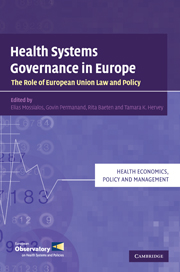Book contents
- Frontmatter
- Contents
- List of figure
- List of tables
- List of boxes
- List of contributors
- Foreword
- Acknowledgments
- List of abbreviations
- 1 Health systems governance in Europe: the role of European Union law and policy
- 2 Health care and the EU: the law and policy patchwork
- 3 EU regulatory agencies and health protection
- 4 The hard politics of soft law: the case of health
- 5 Public health policies
- 6 Fundamental rights and health care
- 7 EU competition law and public services
- 8 EU competition law and health policy
- 9 Public procurement and state aid in national health care systems
- 10 Private health insurance and the internal market
- 11 Free movement of services in the EU and health care
- 12 Enabling patient mobility in the EU: between free movement and coordination
- 13 The EU legal framework on e-health
- 14 EU law and health professionals
- 15 The EU pharmaceuticals market: parameters and pathways
- Bibliography
- Index
4 - The hard politics of soft law: the case of health
Published online by Cambridge University Press: 04 August 2010
- Frontmatter
- Contents
- List of figure
- List of tables
- List of boxes
- List of contributors
- Foreword
- Acknowledgments
- List of abbreviations
- 1 Health systems governance in Europe: the role of European Union law and policy
- 2 Health care and the EU: the law and policy patchwork
- 3 EU regulatory agencies and health protection
- 4 The hard politics of soft law: the case of health
- 5 Public health policies
- 6 Fundamental rights and health care
- 7 EU competition law and public services
- 8 EU competition law and health policy
- 9 Public procurement and state aid in national health care systems
- 10 Private health insurance and the internal market
- 11 Free movement of services in the EU and health care
- 12 Enabling patient mobility in the EU: between free movement and coordination
- 13 The EU legal framework on e-health
- 14 EU law and health professionals
- 15 The EU pharmaceuticals market: parameters and pathways
- Bibliography
- Index
Summary
Introduction
Talk of networked ‘new governance’ is everywhere. It elicits strong reactions – from scorn to extreme enthusiasm and from unthinking participation in new fora to excited applications of recondite social philosophy. Familiarity with the phenomenon also varies. Some forms of new governance are often found in health, but they are not necessarily known as such, while others have long histories outside health but are largely unknown within.
This chapter discusses new governance in EU health policies, examining the mechanisms and frameworks that EU institutions and Member States have introduced into health policy-making. These mechanisms promise to induce law-like behaviour by creating norms and networks (whether they will have that effect, or are intended to have that effect, varies). There are four obvious questions about any new policy development including ‘new governance’, and we answer them in the next three sections. What is it? How did it get started? Why is it happening? And what effect might it have?
A fifth question, naturally, is what has it done? Unfortunately, we cannot reasonably ask that question. For better or for worse, there is not much impact to study. Most new governance processes in health care became operational after 2005, or even later. Furthermore, many of the effects will be on process rather than outcomes – the direct effects will be on the networks and worldviews of policy-makers. The effects on infant mortality or leukemia deaths will often have to be inferred from those process changes.
- Type
- Chapter
- Information
- Health Systems Governance in EuropeThe Role of European Union Law and Policy, pp. 186 - 230Publisher: Cambridge University PressPrint publication year: 2010
- 17
- Cited by



